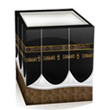Chapter 209: The Excellence of Performing two Rak'ah of Voluntary Prayer after Ablution
- Details
- Category: Ryahd Salehine
- Published on Monday, 07 October 2013 11:50
- Hits: 615
Chapter 209
The Excellence of Performing two Rak'ah of Voluntary Prayer after Ablution
1146. Abu Hurairah (May Allah be pleased with him) reported: The Messenger of Allah (PBUH) said to Bilal (May Allah be pleased with him) "Tell me about the most hopeful act (i.e., one which you deem the most rewarding with Allah) you have done since your acceptance of Islam because I heard the sound of the steps of your shoes in front of me in Jannah.'' Bilal said: "I do not consider any act more hopeful than that whenever I make Wudu' (or took a bath) in an hour of night or day, I would immediately perform Salat (prayer) for as long as was destined for me to perform.''
[Al-Bukhari and Muslim].
Commentary: The word "Tuhur'' is used for "Wudu", Ghusl and Tayammum because one gets the ritual purity by all these means and then one can perform Salat freely. It means that everytime during the day or night Bilal made Wudu'' or Ghusl, he would invariably perform some Nafl prayer. Some of the Ahadith explicitly say two Rak`ah. This act of his so much pleased Allah that he was blessed with the distinction which was witnessed by the Prophet (PBUH) himself. This Hadith proves the merit of performing two Rak`ah prayer after ablution. Some `Ulama' hold that this two Rak`ah prayer as well as Tahiyyat-ul-Masjid are permissible even in hours when Salat is Makruh (undesirable), while others stick to the injunctions which regard Nafl Salat after Fajr and `Asr prayer undesirable.





















